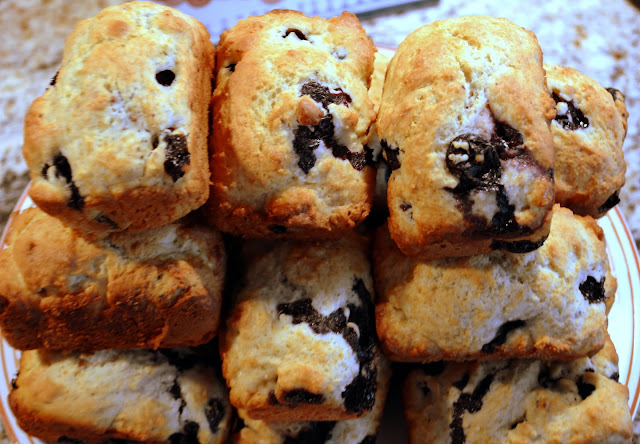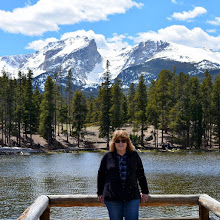Blueberry muffins! Two words that make me happy, and I was especially happy that they came out moist and delicious, as I have been finding baking at a high altitude somewhat difficult, to say the least. When we moved to this 6,000 plus foot area on the Front Range of Colorado, my first attempt at baking a cake was a disaster! I followed my favorite recipe and saw it literally explode in my oven. It bubbled over the pan onto my oven bottom and then the batter drippings began to burn and smoke. I looked like the frantic comedian Lucille Ball, trying to juggle saving my cake while not letting my kitchen go on fire!
Everything I tried to bake was rising too quickly and then would collapse and taste dense and dry. I knew I needed help understanding the difference in baking at high altitude and went online to what is now one of my favorite places to buy books:
Thriftbooks.com. This is a used book site with wonderful low prices, free shipping in the USA, and good service. They may not have every book you want available, but if you find it through them you will find it at big savings! I have no affiliation with Thriftbooks--I just wanted to pass on this great resource for used books.
I found the
New High Altitude Cookbook on Thriftbooks, and have been enjoying reading its hints and instructions. I learned that water boils at a lower temperature at high altitude, and in general foods that boil, like rice and macaroni, take a little longer to cook. Since there is less moisture and oxygen at high altitude, sugars become more concentrated and therefore less is needed, and baking powders and soda in recipes also has to be reduced, while flour and liquids need to be increased slightly. Also, adding an extra regular sized egg or using only extra large eggs for baking will help add moisture. I've also learned that I will most likely have to purchase a pressure cooker, as it will be the best way to make sure dry beans will cook properly! There is even a difference for microwave and slow cooker cooking at high altitude. All in all, it is a matter of experimentation with each recipe to find what works the best. It's a challenge, but I'm learning how to adjust.
Colorado State University has an online PDF with helpful high altitude cooking instructions, for 3,000 feet and above, that you can read on
this link. The United States Department of Agriculture also has a web site about high altitude cooking and food safety on
this link. Since most of the western states are partially or wholly at high altitude, above 3,000 feet, this is information that is valuable to all who live in this part of the country, or in mountainous regions in the rest of the US.
Does all this mean I'll only be using high altitude recipes from now on? No way! I'm just learning how to adjust my favorite recipes for my special circumstances. In fact, the Blueberry Buttermilk Muffin recipe I used to make these muffins was one of my old timers--written on an index card in my collection from a long forgotten source. I adjusted it by decreasing the amount of baking powder slightly and adding an extra regular sized egg. Perfection!
Here's the
original recipe:
Blueberry Buttermilk Muffins
2 1/2 cups flour
2 1/2 teaspoons baking powder
1/2 teaspoon baking soda
3/4 cup sugar
1/4 teaspoon salt
2 eggs, beaten
1 cup buttermilk
4 ounces butter, melted and browned slightly
1 1/2 cups blueberries
1 teaspoon vanilla or almond extract
Whisk dry ingredients together in a bowl
In another bowl mix sugar, eggs, flavoring extract, and melted butter until well blended
Make a well in the dry ingredients and quickly pour in the wet ingredients, mixing quickly until batter is moist--do not over mix!
Fold in blueberries
Spoon into greased muffin cups, 2/3 full
Bake at 400 degrees F, for 20 -30 minutes and golden, or until a cake tester comes out clean when inserted into the middle of each muffin.
They were moist and delicious and not overly sweet, just the way I remembered how they tasted when I lived at sea level in New York City. It felt good to bake again with success! I hope you will also enjoy this recipe.
Do you live in a high altitude area and have a favorite cookbook that you often use for reference or helpful cooking tips you'd like to share? I'd love to know about them!










































































